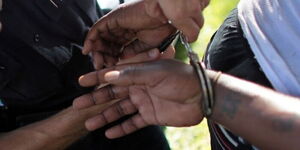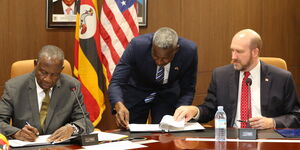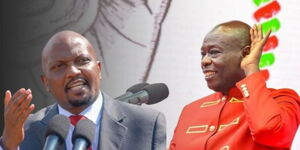Former UDA Secretary General Cleophas Malala ignited a national conversation with the controversial play Echoes of War, whose potential performance by students from Butere Girls High School has led to a string of interesting events.
After the play went viral, what ensued was that Malala was taken into custody. He was the playwright of the controversial play. His detention resulted in protests from the Butere Girls drama team, who refused to perform the play until their director was released.
But what exactly is the play about? Kenyans.co.ke exclusively obtained the official play, and a quick look at it shows why it has been subjected to so much resistance and controversy. This play is a hyperbolic attempt to illustrate the widening gap between two generations: the old and the young.
The play is set in the fictional Royal Velvet Emirates, and it explores a society on the brink of collapse because of the disconnect between two generations - one clinging to tradition and the other demanding change through innovation and technology.
Though fictitious, the themes and dialogues in the play hit close to home, drawing strong parallels to Kenya’s own political and social dynamics.
At the centre of the story is the protagonist Mustafa, a brilliant fourth-year IT student whose passion for tech sees him develop a groundbreaking telemedicine app. His innovation is initially commended by the ruling Sultan, but Mustafa's fortunes turn after his past social media posts criticising the government emerge.
Mustafa is supported by other characters, including Mustafa's mother, who appears as a supportive and concerned parent who consistently advocates for the rights of her son, including his freedom.
The main antagonist in the play is Sultan, who has been depicted as a character fearful of youthful dissent and under pressure from conservative forces. At some point in the play, the Sultan orders Mustafa's execution for his defiance.
This action inevitably ignited a fierce digital uprising led by another powerful character - Anifa Imana - who is depicted as a mysterious put together to be the personification of artificial intelligence.
Anifa ultimately becomes the face of youthful resistance, using social media to swing public opinion her way, circulate fake documents, and incite mass protests. All these efforts are in a frantic bid to save Mustafa and expose the hypocrisy of the ruling elite.
Another supporting character is a police officer, who we later learn in the play is Anifa's father. He is initially apprehensive about Mustafa, but after he is negatively affected by Sultan's regime, he comes around and resigns from his position.
The narrative unfolds against a backdrop of emotional family dynamics, civil unrest, and cultural rigidity.
Among the themes that have been explored in the play are intergenerational conflict and mistrust, innovation vs. tradition, the power of social media and information, justice, mercy, and, to some extent, reconciliation and unity.
One of the main factors that makes the play controversial is not just its thought-provoking themes; it is also some very memorable quotes from the play.
In one instance, a character known as Anifa says, "While others were busy bombing buildings, he was busy bombing me."
Another powerful quote from the play states, "This is a generational war. A war against authorities who have turned a deaf ear to our cries. A war against our own parents, who cling to their rigid ways, are still trapped in the outdated norms and primitive practices of the past. A war against a society that brands us as a rotten generation, condemning us without understanding. A war against the religious leaders who chain our modern minds, refusing to let us explore the possibilities of a new world."
Towards the end of the play, the two opposing groups—the young and the old—set aside their intergenerational conflict. They come to realize a larger truth: it is not worth sacrificing their society to the 'Echoes of War'.
In the end, Sultan, the ruler of the Royal Velvet Emirates, says, "Never again shall we dance to the… ECHOES OF WAR..." as he declares peace and an end of the war between the young and old generations.












